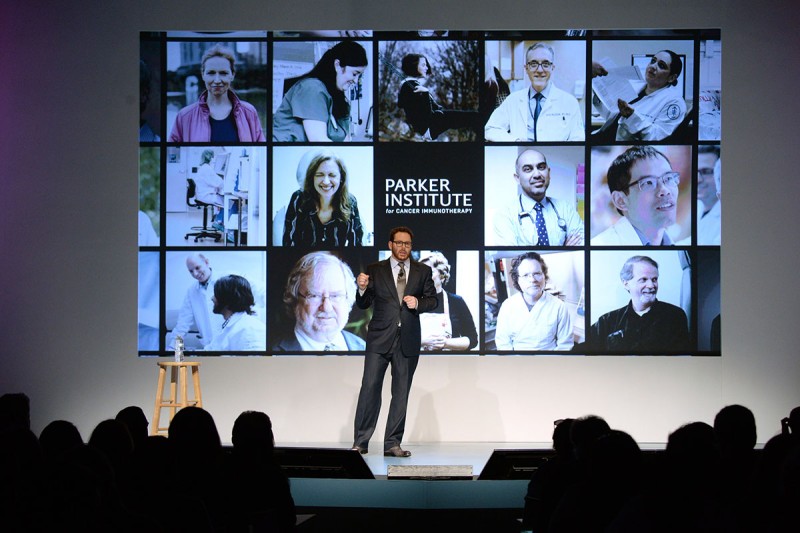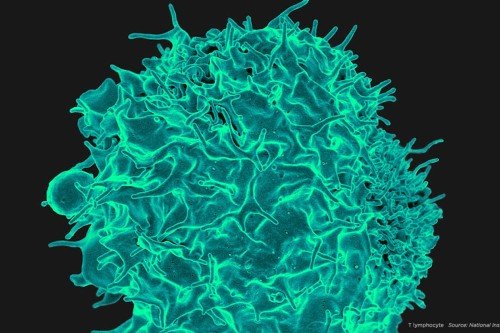
Sean Parker announced today the establishment of the Parker Institute for Cancer Immunotherapy, of which MSK is a founding member. Photo Credit: Getty Images.
Serial tech entrepreneur Sean Parker first made a name for himself in the early 2000s as the brains behind Napster and Facebook. In recent years, Mr. Parker has turned his entrepreneurial zeal — and the considerable wealth he has accumulated as a result — to addressing pressing matters of public health.
Today, the Parker Foundation, of which Mr. Parker is the founder and president, announced the creation of a new venture — the Parker Institute for Cancer Immunotherapy (PICI), a network of scientists and research centers geared toward unlocking the power of the immune system to fight cancer. The new institute is enabled by a $250 million grant from the Parker Foundation.
Memorial Sloan Kettering joins with five other leading players in the cancer immunotherapy field as part of PICI — University of Texas MD Anderson Cancer Center; Penn Medicine; Stanford Medicine; University of California, Los Angeles; and University of California, San Francisco.
The Parker Institute at MSK will be directed by Jedd Wolchok, an expert on melanoma and the immunotherapy approach known as checkpoint blockade, and co-directed by Marcel van den Brink, a specialist in blood cancer and bone marrow transplantation.
Immunotherapy represents a fundamentally different way of treating cancer than standard approaches such as chemotherapy and radiation. Rather than targeting the tumor, it instead targets a patient’s immune system, empowering it to seek out and destroy cancer. The result is a more dynamic and potentially more lasting response that is leading to cures in some cases.
“Cancer immunotherapy is the disruptive technology of cancer medicine,” Dr. Wolchok said. “It disrupts the entire paradigm that we’ve used for the last five decades.”
MSK: Where Immunotherapy Began
The choice of Memorial Sloan Kettering as a founding member of the Parker Institute reflects MSK’s rich legacy of leadership in the field. Immunotherapy was born at MSK, more than a century ago, and since that time MSK scientists have led the effort to develop immune-based treatments for cancer. (See timeline of progress.)
MSK investigators have also been at the epicenter of recent work in the field that has led to dramatic breakthroughs and catalyzed renewed interest in immunotherapy.
Dr. Wolchok has played a central role in the clinical development of immune checkpoint inhibitors — drugs that “release the brakes” on the immune system, allowing it to mount a stronger attack against cancer. Clinical trials that he spearheaded led to the FDA approval of the first checkpoint inhibitor drug, ipilimumab, for advanced melanoma in 2011.
Dr. van den Brink has pioneered new techniques for immune reconstitution following stem cell transplants, including manipulating the microbiota — the colony of microbes that live in our gut.
The team of Michel Sadelain, Renier Brentjens, and Isabelle Rivière has pioneered chimeric antigen receptor (CAR) T cell therapy, an approach that is leading to dramatic cures in some patients with leukemia.
And MSK immunologist Alexander (Sasha) Rudensky has deepened our understanding of how the immune system is kept in check by regulatory T cells, opening up promising new targets for cancer immunotherapies.
Back to topNew Trial Launched
The support offered through the Parker Institute for Cancer Immunotherapy will allow MSK researchers to build on their leadership as they search for new ways to extend the benefits of immunotherapy to even more patients.
The first clinical trial funded by this initiative has opened and will be led by MSK researchers. It will answer the crucial question of whether melanoma patients whose cancer has not responded to a PD-1 immunotherapy (or has worsened while on this treatment) can respond to ipilimumab or the combination of ipilimumab plus nivolumab.
Dr. van den Brink thinks MSK’s participation in PICI will be a boon to both MSK and the field as a whole. “What I personally hope is that with PICI we can mobilize the various efforts that have been going on at a smaller scale at MSK,” he said. “There are so many things that we’re doing that will now get the attention and funding to help them develop into viable therapies.”
He added: “I think what we’re going to see in five years is that immunotherapy is going to be used for many more cancers. And the Parker Institute is poised to lead that important effort.”
Back to top